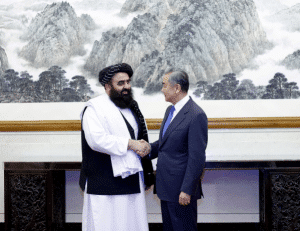PNN – After NATO’s withdrawal from Kabul in 2021, the United States has taken action to revive its strategic presence and counter China’s growing influence in Afghanistan, while Beijing, in turn, is consolidating its position in the country through large investments and strengthening relations with the Taliban.
According to the report of Pakistan News Network, citing the online publication “Kardel”, since the withdrawal of the United States and NATO from Kabul in 2021, Afghanistan has become the core of intense regional activities. The Taliban-led government has welcomed billions in foreign investment in mining and communications, while its ties with China and Russia have deepened and efforts by US President Donald Trump’s administration to cut off Beijing’s access to Afghanistan’s vital minerals have begun.
China has already invested $14 billion in Afghanistan’s mining, oil, and agricultural sectors. It has also rebuilt the Wakhan border with Afghanistan as part of a broader strategy. Beijing and Moscow’s growing influence over the Taliban appears to be paying off; Afghanistan announced in May that it intended to join the dollar-banning plan and develop local currency trading mechanisms with both Eurasian powers.
Read more:
Russia welcomes Elon Musk’s father amid his differences with Trump
On the other hand, as tensions between Pakistan and Afghanistan escalated, China quickly intervened to balance the regional equation. It was only a few days after the Pakistan-India border clashes that Beijing summoned officials from Kabul and Islamabad for talks.
On May 21, Chinese Foreign Minister Wang Yi hosted an informal meeting in Beijing between Pakistani Deputy Prime Minister Ishaq Dar and Afghan Acting Foreign Minister Amir Khan Muttaqi. According to a statement from the Chinese Foreign Ministry, both sides broadly agreed to resume diplomatic relations and promote bilateral relations.
Why is Afghanistan important to China?
First, Afghanistan is crucial to China’s westward expansion of its Belt and Road Initiative (BRI). Second, the country’s vast reserves of lithium, copper, and iron are key to China’s technology industry. Third, Beijing opposes any Indian presence in Afghanistan. Finally, security interests compel China to engage directly with the Taliban.

Beijing’s efforts to establish itself in Kabul intensified when Washington announced in February that it intended to restore its influence in Afghanistan. This effort was intensified after the US president pointed out in May that Bagram Air Base in Afghanistan was just an hour away from China’s nuclear missile production facility.
Trump, stating that his plans are to curb China’s operational control over the base, clarified: We should have kept this base. China is expanding its arsenals right next door, and we left Bagram.
But the Taliban has denied China’s presence in Bagram, and Taliban spokesman Zabihullah Mujahid said: The claims that China controls this airbase are ‘based on baseless information’ and that Bagram is controlled by the Taliban, not China. There are no Chinese forces here and we do not have such an agreement with any country.
Reconstruction of Bagram Air Base and the New Big Game
Despite America’s attritional engagements on two major fronts (in Ukraine and Gaza), Washington continues to actively pursue its actions to target China’s supply chains and regain strategic positions lost in 2021.
The improvement in US-Taliban relations reportedly began after the 2024 election and Trump’s inauguration. In March, a delegation led by US envoy Adam Buehler and veteran diplomat Zalmay Khalilzad traveled to Kabul to negotiate the release of detained American tourist George Golzman.
The Afghan representative informed the American delegation that Gulzman was being released on humanitarian grounds and as a gesture of goodwill.
Washington’s renewed focus on a country it has occupied and devastated for 20 years is therefore accelerating relations with Afghan factions to foster stability in its own way, a key goal of sidelining the United States and its allies in the region’s latest geopolitical competition.

